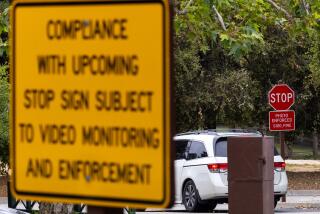Just the Ticket for Raising Local Government Revenue
- Share via
It was Jan. 5, a cool, clear Tuesday afternoon, just before 4 o’clock.
Andy Yager, riding his bike home from Westminster High School and just two weeks shy of his 17th birthday, didn’t realize it, but he was about to do his bit to help government with its budgetary problems.
Yager was pedaling near the intersection of Westminster Boulevard and Springdale Street when Westminster Police Officer Adelle Wagner pulled him over. Young Yager had scored the Vehicle Code hat trick: he was riding on the wrong side of the street, he was wearing a Walkman and his bike was unregistered.
Before reading on, take a moment and settle in your mind on what you think a reasonable penalty for those offenses might be. Twenty bucks? Fifty bucks? Surely not as high as a hundred.
Would you believe $168?
Andy’s father, Andrew Sr., couldn’t believe it, but he had to--because he ended up paying it. That was the amount listed on the form sent a few days later to the Yager home. Paying it meant young Yager didn’t have to show up later in court.
The elder Yager, who works for a federal law enforcement agency, is having a hard time swallowing it and wonders if government isn’t trying a bit too hard to generate some revenue. He wonders about other kids or families who don’t have the wherewithal to write a check for $168.
If it had been me, I would have been furious being given a ticket in the first place, but then, I’ve got a bad attitude. Whatever happened to those nice Irish cops who stopped kids, gave them an inspirational talk and let them go with a warning?
But no, Yager isn’t complaining about the ticket or Officer Wagner.
Are you mad she stopped your son? I asked him.
“No, I’m glad she did,” Yager said. “She wears a uniform and that’s her job.” Yager thinks what’s missing in all this is the emphasis on paying a monetary fine instead of education. He’s not just talking about his son, he said, but other youthful offenders.
“We have no quarrel that violations occurred and that he needs to pay his debt,” the elder Yager said. “My view is that they should have to spend a Saturday morning . . . go to a seminar, see a good film, impress on them the need to be safety-conscious while they’re out there on their bikes.”
Yager said he paid the fine for his son because they didn’t want the hassle of going to court. The city doesn’t have bicycle-safety classes in lieu of paying fines, police said.
Westminster Police Sgt. Dave Stronach said he sympathizes with Yager about the size of the fine, but that police are trained not to take that into consideration when they see violators. The multiple violations almost sound like young Yager “was looking to get hit” with a ticket, Stronach said, but added that “he probably should have appeared (in court); he probably should have gotten it reduced.”
OK, but what about the size of the penalty? Isn’t government a bit overzealous in levying fines that big for relatively minor offenses? After all, a bike registration costs $10.
Stronach said most of the money from fines goes for court costs, under the theory that people who use the court system should pay for it.
A court official, however, said that isn’t quite accurate. Bert Bream, senior staff analyst with the Municipal Court in Westminster, said the bulk of the money Yager paid represents a “state assessment” that is set at 170% over and above the amount of the fine. In other words, for every $10 in fines, the state assesses another $17, Bream said. The money is divided among city, county and state government, with the state increasing its share through new legislation passed in 1991.
The formula for dividing up fines gets complicated, Bream said, but he said the state probably got more than half of the $168 paid by the Yagers. When the state drafted the legislation in 1991 that increased the assessment tacked onto tickets and increased the state’s share of that revenue, Bream said, the bill made note of the state’s worsening fiscal situation.
Although Bream has nothing to do with setting the fine and assessment, I asked him if the amount charged young Yager didn’t seem excessive, considering the offenses.
“It’s real difficult to disagree with you,” Bream said.
Like a lot of things in this life, it’s hard to know who to get mad at. Officer Wagner did her job, and the court system simply administered the law. On the day the state legislators set the fine and assessment schedules, I wonder if they pictured 16-year-old kids on bicycles as the way out of the budgetary problems.
Assuming for a minute that they did, I’m sure the city of Westminster, the county of Orange and the state of California thank you, young Mr. Yager, for your cooperation.
More to Read
Sign up for Essential California
The most important California stories and recommendations in your inbox every morning.
You may occasionally receive promotional content from the Los Angeles Times.










